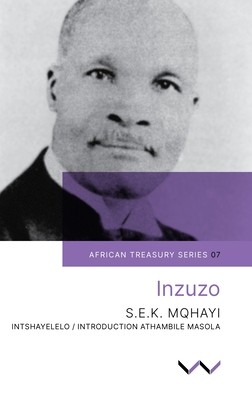
- We will send in 10–14 business days.
- Author: Samuel Edward Krune Mqhayi
- Publisher: Wits University Press
- ISBN-10: 1776149165
- ISBN-13: 9781776149162
- Format: 12 x 19 x 0.9 cm, minkšti viršeliai
- Language: English
- SAVE -10% with code: EXTRA
Reviews
Description
Inzuzo is a classic collection of poems, first published in 1943, about religion, nature, life and historical events and prominent figures in the history of Africans. It has five sections: Izabelo (Distributions), Izibongo ezingokufa nokuthwasa komnyaka (Poems about death and the beginning of the year), Izibongo ezingabafi bethu (Poems about the dead), Izibongo ngabawele iilwandle (Poems about people who have travelled overseas) and Ingqokelela (Collection). In each section, Mqhayi proved himself to be a literary author with the ability and skill to transform from a traditional poet to a modern poet. This ability is most evident in the first section, Izabelo, with poems composed in a manner that demonstrates western influence in their structure. Mqhayi was able to combine modern versification with the diction and artistic form of izibongo (praise poems). Mqhayi's poetry is also a storehouse of historical events as in poems like Umnyaka omtsha, 1915 (New Year, 1915), Aa! Zweliyazuza! (Hail Great Britain on whom the sun never sets!), and Umfikazi uCharlotte Manyhi Maxeke, a tribute to Charlotte Manyhi Maxeke. In these poems, his style as a praise poet is distinct. The poems portray Mqhayi as a religious and social poet. He took an interest in the welfare of his people and embraced African culture. Known as the father of isiXhosa contemporary and traditional poetry, Mqhayi was a well-known imbongi (praise poet) who was revered as Imbongi yeSizwe Jikelele (National Poet).
EXTRA 10 % discount with code: EXTRA
The promotion ends in 23d.19:38:55
The discount code is valid when purchasing from 10 €. Discounts do not stack.
- Author: Samuel Edward Krune Mqhayi
- Publisher: Wits University Press
- ISBN-10: 1776149165
- ISBN-13: 9781776149162
- Format: 12 x 19 x 0.9 cm, minkšti viršeliai
- Language: English English
Inzuzo is a classic collection of poems, first published in 1943, about religion, nature, life and historical events and prominent figures in the history of Africans. It has five sections: Izabelo (Distributions), Izibongo ezingokufa nokuthwasa komnyaka (Poems about death and the beginning of the year), Izibongo ezingabafi bethu (Poems about the dead), Izibongo ngabawele iilwandle (Poems about people who have travelled overseas) and Ingqokelela (Collection). In each section, Mqhayi proved himself to be a literary author with the ability and skill to transform from a traditional poet to a modern poet. This ability is most evident in the first section, Izabelo, with poems composed in a manner that demonstrates western influence in their structure. Mqhayi was able to combine modern versification with the diction and artistic form of izibongo (praise poems). Mqhayi's poetry is also a storehouse of historical events as in poems like Umnyaka omtsha, 1915 (New Year, 1915), Aa! Zweliyazuza! (Hail Great Britain on whom the sun never sets!), and Umfikazi uCharlotte Manyhi Maxeke, a tribute to Charlotte Manyhi Maxeke. In these poems, his style as a praise poet is distinct. The poems portray Mqhayi as a religious and social poet. He took an interest in the welfare of his people and embraced African culture. Known as the father of isiXhosa contemporary and traditional poetry, Mqhayi was a well-known imbongi (praise poet) who was revered as Imbongi yeSizwe Jikelele (National Poet).


Reviews